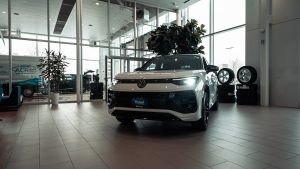As more drivers make the switch to electric, one of the first decisions they face is how—and where—to charge their vehicle. While public charging networks are expanding, many EV owners are considering installing a home charger for everyday convenience. So how do you know which option is right for you? It all comes down to your routine, location, and driving habits.
Pros of Home Charging
Charging at home offers flexibility, convenience, and long-term savings—especially for daily drivers.
- Charge overnight: Plug in while you sleep and wake up to a full battery every morning.
- Lower energy costs: Home electricity rates are typically cheaper than public charging, especially overnight.
- No wait times: You’re never in line or stuck searching for an available charger.
- Set it and forget it: With a Level 2 charger, most EVs can charge fully in 6–10 hours.
- Increased control: Track your charging schedule and energy use with built-in vehicle or charger apps.
Cons of Home Charging
While convenient, home charging isn’t always practical for every driver or living situation.
- Requires a garage or driveway: Not ideal for apartment or condo dwellers without dedicated parking.
- Upfront installation cost: A Level 2 charger and professional installation can be costly.
- Electrical upgrades may be needed: Older homes may require panel upgrades or permits.
- Slower than fast charging: Even Level 2 charging takes several hours—less convenient for spontaneous long trips
Best For: Home Charging
Home charging is best for EV owners who:
- Have a garage or private driveway
- Drive consistently day-to-day (commuting, school runs, errands)
- Prefer the convenience of overnight charging
- Want long-term savings and minimal reliance on public infrastructure

Pros of Public Charging
Public charging offers flexibility, speed, and accessibility—especially when you’re away from home.
- Widespread availability: Charging networks are expanding rapidly across Canada.
- DC fast charging: Many public stations offer rapid charging—some can get you to 80% in under 30 minutes.
- No installation required: Ideal for drivers without access to home charging (e.g., condo dwellers, renters).
- Helpful for long trips: Easily top up during road trips or unexpected detours.
- Pay-as-you-go options: Many stations use apps or tap-to-pay for quick access without long-term commitments.
Cons of Public Charging
While convenient on the go, public charging does come with a few challenges:
- Wait times and availability: Stations may be busy or out of service, especially during peak times.
- Inconsistent pricing: Charging rates can vary by provider, location, or time of day.
- Slower than expected: Not all public chargers are fast chargers—some Level 2 stations can still take hours.
- Charger compatibility: Some stations may not work with all EV models without an adapter.
- Less convenient for daily use: Regular trips to public stations can be time-consuming compared to at-home charging.
Best For: Public Charging
Public charging is a better fit for EV drivers who:
- Live in condos, apartments, or homes without access to private parking
- Take frequent road trips or drive long distances
- Prefer flexible, on-the-go charging options
- Don’t want to invest in home charging installation
- Need occasional top-ups rather than daily charging

Which Is Better? It Depends on Your Lifestyle
There’s no one-size-fits-all answer when it comes to EV charging. If you have regular access to a garage or driveway and drive consistent daily routes, home charging offers unbeatable convenience and long-term savings. But if you live in a condo, travel frequently, or prefer flexibility, public charging gives you the freedom to charge where and when it works best.
For many EV drivers, a combination of both ends up being the most practical solution—charge at home when you can and rely on public stations when needed.
How Birchwood Can Help
Whether you’re considering your first EV or looking to better understand your charging options, Birchwood is here to help. Our team can walk you through the benefits of home charging, explain how public networks work, and even connect you with trusted partners for charger installation. We’re committed to making your transition to electric driving simple, informed, and stress-free—every step of the way.
Check out Birchwood’s evHub to learn more!


